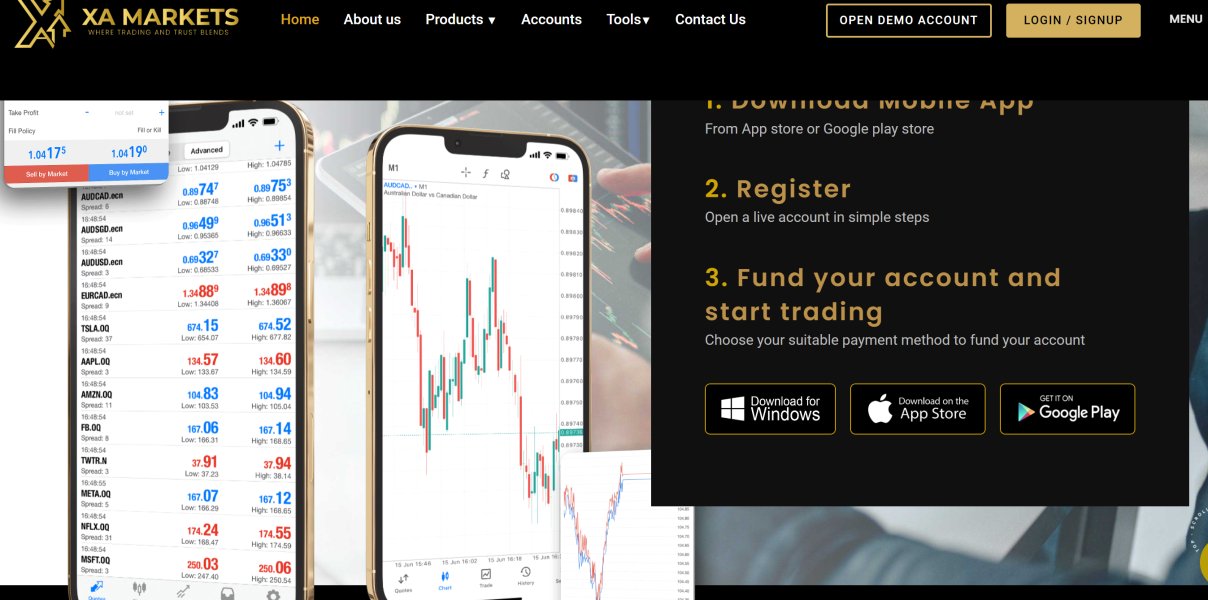MFS Investment Management 2025 Review: Everything You Need to Know
Executive Summary
MFS Investment Management stands as one of the most established names in the global investment management industry. The company has a remarkable history spanning over a century. Founded in 1924, this mfs review reveals that the company has built a solid reputation as a pioneer in the mutual fund industry, serving as an exclusive advisory firm for institutional investors. MFS Investment Management operates as a US-based global investment management company. The firm has maintained its position as an industry leader through decades of market evolution.
The firm's primary focus centers on providing comprehensive investment management services to institutional clients. This approach distinguishes the company from retail-focused brokers in the forex and CFD space. While MFS has established a strong foundation in traditional investment management, this review examines how the company positions itself in the modern trading landscape. The company's long-standing presence in the financial services sector demonstrates institutional trust and regulatory compliance. However, specific trading conditions and retail services require further examination for individual traders seeking forex and CFD opportunities.
Important Notice
This comprehensive evaluation is based on available public information and industry reports about MFS Investment Management. MFS primarily serves institutional investors, and specific details regarding retail trading conditions, regulatory jurisdictions for individual traders, and cross-regional entity differences are not extensively detailed in available sources.
Our review methodology incorporates analysis of company background, institutional services, and available user feedback to provide a balanced assessment. Potential clients should conduct independent research and directly contact MFS for specific service details and current offerings.
Rating Framework
Broker Overview
MFS Investment Management emerged in 1924 as Massachusetts Financial Services. The company established itself as a groundbreaking force in the American investment management landscape. The company's founding coincided with the early development of the modern mutual fund industry, positioning MFS as one of the original architects of collective investment vehicles. Over nearly a century of operations, MFS has evolved from a regional financial services provider into a globally recognized investment management firm. The company maintains its headquarters in the United States while expanding its reach to serve institutional clients worldwide.
The company's business model centers exclusively on institutional investment management. This approach differentiates the firm from traditional retail forex and CFD brokers that serve individual traders. MFS specializes in providing comprehensive asset management solutions, portfolio construction services, and investment advisory support to institutional clients including pension funds, endowments, and other large-scale investors. This institutional focus has allowed MFS to develop specialized expertise in long-term investment strategies and large-scale asset allocation. However, it may limit direct applicability for individual forex traders seeking retail trading opportunities.
MFS operates with a global perspective while maintaining its American roots. Specific details about trading platforms, asset classes available to retail clients, and regulatory oversight for individual traders are not extensively documented in current sources. This mfs review indicates that potential retail clients may need to seek additional information directly from the company to understand available services and trading conditions.
Regulatory Jurisdictions: Specific regulatory information for retail trading services is not detailed in available sources. The company's long-standing institutional presence suggests appropriate regulatory compliance.
Deposit and Withdrawal Methods: Current sources do not provide specific information about deposit and withdrawal options for individual trading accounts.
Minimum Deposit Requirements: Minimum deposit information for retail trading accounts is not specified in available documentation.
Bonuses and Promotions: No specific information about trading bonuses or promotional offers is available in current sources.
Tradeable Assets: MFS specializes in investment management. Specific details about tradeable assets for individual traders are not extensively documented.
Cost Structure: Detailed fee structures for retail trading services are not specified in available sources. Institutional fee arrangements may differ significantly from retail trading costs.
Leverage Ratios: Leverage information for individual trading accounts is not provided in current documentation.
Platform Options: Specific trading platform details for retail clients are not extensively covered in available sources.
Geographic Restrictions: Regional limitations for individual traders are not detailed in current documentation.
Customer Service Languages: Specific language support information is not provided in available sources.
This mfs review reveals that while MFS maintains a strong institutional presence, detailed retail trading information requires direct inquiry with the company.
Detailed Rating Analysis
Account Conditions Analysis
The evaluation of MFS Investment Management's account conditions presents unique challenges due to the company's primary focus on institutional clients rather than individual retail traders. Available sources do not provide comprehensive details about account types specifically designed for forex or CFD trading, minimum deposit requirements, or account opening procedures for individual traders. This institutional focus suggests that MFS may offer sophisticated account structures designed for large-scale investors. These structures may not align with typical retail trading account expectations.
Traditional account features such as Islamic accounts, micro accounts, or standard retail trading account types are not specifically mentioned in available documentation. The account opening process, verification requirements, and onboarding procedures for individual traders remain unclear based on current sources. This mfs review indicates that potential retail clients would need to contact MFS directly to understand available account options. They must also determine whether the company offers services suitable for individual trading needs.
Without specific information about leverage options, margin requirements, or account protection features, it's difficult to assess how MFS account conditions compare to standard forex and CFD brokers. The institutional nature of the business suggests that account conditions may be highly customized rather than following standardized retail trading account structures.
MFS Investment Management's approach to trading tools and resources appears to be oriented toward institutional-grade investment management solutions rather than traditional retail trading platforms. Available sources do not provide detailed information about specific trading tools, charting software, or technical analysis resources that would typically be expected from forex and CFD brokers. The company's long history in investment management suggests sophisticated analytical capabilities. However, these may be designed for institutional portfolio management rather than individual trading activities.
Research and analysis resources likely exist given MFS's institutional focus. Specific details about market research, economic calendars, trading signals, or educational materials for individual traders are not extensively documented in current sources. The absence of information about automated trading support, expert advisors, or algorithmic trading capabilities suggests that MFS may not offer the typical suite of retail trading tools.
Educational resources, webinars, trading tutorials, or beginner-friendly materials that are standard offerings from retail brokers are not specifically mentioned in available documentation. This gap in information indicates that MFS's service model may prioritize institutional relationships over individual trader education and support.
Customer Service and Support Analysis
Customer service and support evaluation for MFS Investment Management is limited by the lack of specific information about service channels, response times, and support quality for individual traders. The company's institutional focus suggests that client service may be highly personalized and relationship-driven. This model may not translate directly to the support expectations of retail forex and CFD traders.
Available sources do not detail specific customer service channels such as live chat, phone support hours, email response times, or multilingual support options that are typically expected from retail trading platforms. The absence of information about 24/7 support, weekend availability, or support during major trading sessions raises questions about service accessibility for active traders.
Service quality metrics, problem resolution procedures, and escalation processes for individual traders are not documented in current sources. Without user feedback specifically related to customer service experiences, it's challenging to assess whether MFS provides the responsive, accessible support that retail traders typically require for time-sensitive trading activities.
Trading Experience Analysis
The trading experience evaluation for MFS Investment Management is significantly limited by the lack of available information about retail trading platforms, execution quality, and individual trader-focused features. Current sources do not provide details about platform stability, order execution speed, or trading environment characteristics that are crucial for forex and CFD trading assessment.
Platform functionality, user interface design, mobile trading capabilities, and cross-device synchronization features are not specifically documented for retail trading services. The absence of information about order types, execution models, slippage rates, or trading during high-volatility periods makes it difficult to assess the practical trading experience that individual clients might encounter.
Market access, trading hours, instrument availability, and real-time data quality are not detailed in available sources. This mfs review cannot provide specific insights into the day-to-day trading experience without more comprehensive information about the company's retail trading infrastructure and platform capabilities.
Trust and Reliability Analysis
MFS Investment Management demonstrates strong institutional credibility through its nearly century-long presence in the investment management industry. This longevity suggests a foundation of trust and reliability within the professional investment community. The company's establishment in 1924 and continued operation through multiple market cycles indicates operational stability and regulatory compliance. However, specific regulatory details for retail trading services are not extensively documented.
Fund security measures, segregation of client assets, and investor protection protocols are not specifically detailed in available sources for individual trading accounts. While the company's institutional focus suggests sophisticated risk management and compliance procedures, these may not directly address the security concerns and protection measures that retail traders typically evaluate when selecting a broker.
Industry reputation within the institutional investment management sector appears strong based on the company's longevity and continued operation. Third-party ratings, regulatory actions, or negative incident handling specific to retail trading services are not documented in current sources. The absence of detailed regulatory information for individual traders limits the ability to fully assess trust factors that are crucial for retail trading decisions.
User Experience Analysis
User experience analysis for MFS Investment Management is constrained by limited information about individual trader satisfaction, interface design, and retail client feedback. The company's institutional orientation suggests that user experience may be optimized for professional investment managers rather than individual traders seeking intuitive, accessible trading platforms.
Interface design, ease of navigation, registration procedures, and account verification processes for retail clients are not detailed in available sources. The user journey from account opening through active trading is not documented. This makes it difficult to assess whether MFS provides the streamlined, user-friendly experience that retail traders typically expect.
User feedback, satisfaction ratings, and common complaints specific to individual trading services are not available in current documentation. Without comprehensive user testimonials or experience reports from retail clients, this evaluation cannot provide specific insights into the practical user experience that individual traders might encounter with MFS services.
Conclusion
This comprehensive mfs review reveals that MFS Investment Management stands as a well-established institutional investment management firm with nearly a century of industry experience. However, the review presents significant information gaps regarding retail trading services. While the company's long-standing presence in the financial services industry suggests institutional credibility and operational stability, the lack of detailed information about retail trading conditions, platforms, and individual client services makes it challenging to provide a complete assessment for forex and CFD traders.
MFS appears most suitable for institutional investors and clients seeking professional investment management services rather than individual traders looking for accessible forex and CFD trading opportunities. The absence of specific information about trading platforms, account conditions, regulatory oversight for retail clients, and customer support structures indicates that potential individual traders should conduct direct inquiries with the company to determine service availability and suitability for their trading needs.




